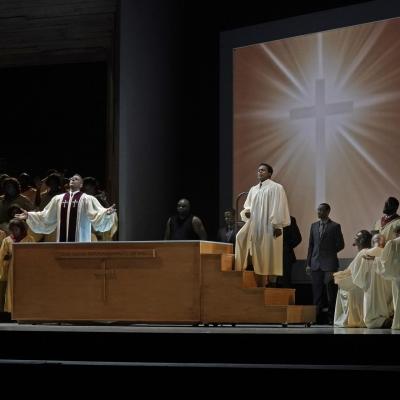Historic Reopening in Met Opera Live with Fire Shut Up In My Bones
After 18 months of closure, New York's Metropolitan Opera opens its 2021/2022 season with the powerful "Fire Shut Up In My Bones" by composer and jazzman Terence Blanchard with a libretto by Kasi Lemm
The performance is an event in more ways than one, marking the reopening of the Metropolitan Opera House in New York after many difficult months. The Met does not hide its pride in presenting for the first time in its history a work by an "African-American composer" (opening a new era in which "African-American" composers will have their place in the programming of the prestigious hall) and to allow several hundred thousand spectators to discover it live in theaters around the world.
Premiering in 2019 at the Opera House in St. Louis, Missouri, this is the second opera by composer and trumpeter Terence Blanchard. Jazz has its place here, bringing drums, piano, guitar and bass guitar alongside traditional instruments in the orchestra pit. If the beginning of the first act, without an overture, makes one fear a rather functional music, it quickly fleshes out and gains in intensity. Although a few rare transitions are a bit abrupt (essentially because they are absent), the work never loses its rhythm. The music accompanies the arias of the singers with relevance while bringing sometimes some comments and also making hear some beautiful instrumental pages, such as the choreographed opening of act II. The ear quickly becomes accustomed to the alternations and fusions of classical instruments with those of jazz, bringing a very appropriate American touch. The institution's Music Director, Yannick Nézet-Séguin, takes great pleasure in conducting this work in which lively rhythms can precede particularly poignant passages.

Director Kasi Lemmons is writing her first opera libretto, but manages to convey the power of journalist Charles M. Blow's autobiographical work of the same name. In it, Blow recounts his particularly difficult childhood in the American South: the last boy of five, suffering from the lack of love of a betrayed and exhausted mother, endowed with a sensitivity that earned him mockery and loneliness, and above all growing up with the heavy secret (burning "like fire shut up in his bones" as the title announces from the outset) of having been sexually abused by his cousin, when he was only seven years old. The story is set in an African-American community and the cast is made up entirely of African-American performers, but the opera deals with deep and universal issues. James Robinson's staging, in close collaboration with choreographer Camille A. Brown, is discreetly involved in this process, proposing as simple sets projections on two large parallelepipeds on wheels or by the revolving stage, allowing the addition of props and furniture with fluidity. In addition to the beautiful and melancholic choreography of the opening of Act II, with the dancing figures that haunt Charles' nights, the audience is particularly enthusiastic about the impressive and modern tap dance number that opens Act III.
The main character, Charles, is played by baritone Will Liverman, with a secure voice and rich, intense tone. His most touching arias recall his childhood ambitions, and mark his character's resilience: his aspirations for freedom on the road to acceptance. During recitatives, he sings double with himself, aged seven, played by the young and talented Walter Russell III. The latter, present in all three acts, delivers delicate but always precise melodies, while maintaining his stage presence with a child's voice whose soft awkwardness of the vocal line is truly touching, even moving. Rightly acclaimed during the salutes, he cannot hold back his tears of recognition and happiness.
Charles also performs beautiful duets with his "Destiny" or his "Solitude" who is none other than his first great (unhappy) love: Greta, interpreted by the soprano Angel Blue. Her voice and stage presence are quite charming. Her phrasing seems natural, offering an interpretation that is always captivating, with sustained lows and brilliant highs. Her aria is as touching as her duet with Charles is strong.
Even if at the beginning and end of the evening soprano Latonia Moore has to make great efforts to keep her own emotion from weakening her vocal line, her interpretation of Billie, Charles' mother, is often moving, always very committed. Especially since Terence Blanchard reserves some particularly strong and heartbreaking arias for her (notably the sad lesson of a mother to her son or her intense and profound prayer). Her voice is bright, colorful and assertive.
The secondary characters are not lacking in presence either, all sharing their rich voices, with a grain of timbre unique to the vocal traditions gathered here, a fleshy, sparkling tone for the female singers. Charles' father, the misogynistic womanizer Spinner, is played by tenor Chauncey Packer with assurance. Baritone Chris Kenney plays cousin Chester with a seductive, full, phrasing tone, spiked with a hint of sassiness that suits his sad character well. The pastor and president of the college fraternity is sung with poise by bass-baritone Donovan Singletary, whose tone is quite appealing, while Uncle Paul is played with wisdom and depth by bass-baritone Ryan Speedo Green. The quartet of brothers is manly as Calvin Griffin, Terrence Chin-Loy, Errin Duane Brooks and Norman Garrett. The audience salutes them as well as soprano Denisha Ballew as Verna and her young colleague Brittany Renee as Evelyn for their brief interventions. Finally, the mostly women's chorus, prepared by Donald Palumbo, brings all its colors from the wings.
The audience applauds for a long time the artists of this production, not only happy to be back in the prestigious hall of the Met, but showing itself very touched and even moved by this particularly powerful work which knows how to speak to all of us about deep subjects with a very appreciable dignity.
